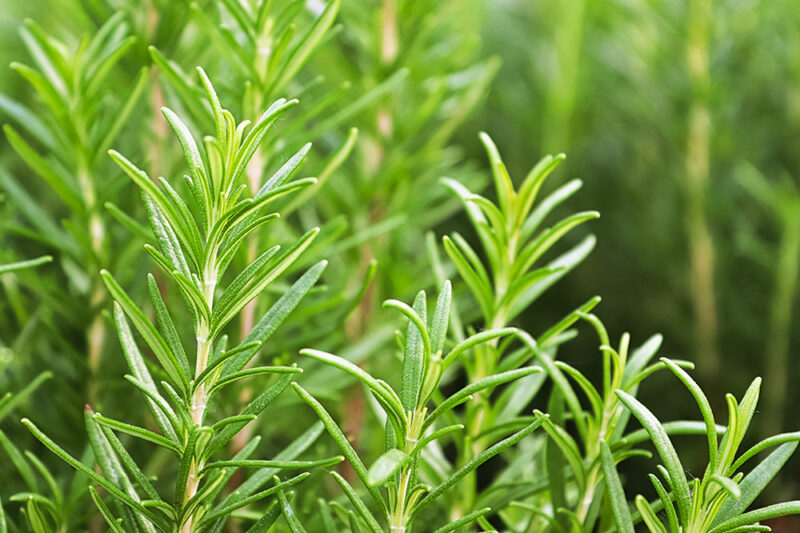
Fresh rosemary
Many of you may already know about the traditional dandelion and chicory “coffee” combination, but are you aware of rosemary “coffee”? While dandelion and chicory clear the liver instead of congesting it and draining the adrenals, as coffee does, rosemary courses energy through the liver, giving very similar effects as coffee without its negative effects on the adrenals and liver.
In general, caffeine drains energy reserves from the adrenals to create a temporary sense of well-being. Drinking coffee to push through tiredness ultimately leads to adrenal exhaustion, which is very difficult to replenish (bags under the eyes are one impending sign of this). It may take years for adrenal exhaustion to show up, and then suddenly take you by “surprise.” Coffee is especially harmful this way and becomes a “catch-22” of needing coffee to wake up while at the same time it makes you tired (the adrenal exhaustion). If you can drink coffee after 5 PM and it doesn’t affect your sleep, this means your adrenals aren’t responding and well on their way to exhaustion.
If you are tired of experiencing frequent and/or night time urination, low back and/or knee pain, shoulder and/or neck pain, irritability, being easily angered, bladder, vaginal, or prostate infections, nausea, or pain in the rib area, then you might want a substitute that also gives energy and mental clarity. Look no further than rosemary coffee (actually, a tea).
I first learned about rosemary as a coffee substitute from a patient years ago when she told me how it gave her the same exact life as coffee without its side effects. Since I’m not a coffee drinker, I’ve never tried it myself. But I told other patients about it and received similar reports.
Recently I gave it to a 37 year-old woman who just drove 10 hours from San Diego to get to my home and the next day two hours to San Francisco where she recorded new piano works for a day and then 2 hours back, both trips with two dogs, one a 7 month-old energetic puppy. The following day she woke up weary and exhausted, not at all looking forward to packing and another long drive home.
Normally she would have had coffee, but I fixed her fresh rosemary tea. Within one hour of that cup, I found her energetically packing, lugging everything to the car, and in general acting as her normal perky self. I asked how she felt and she said, “Good, I have energy!” And as I had told her, the energy came on slowly and gently rather than with a jolt.
I didn’t make the rosemary “coffee” strong as I only used four ‘stalks,’ each about three inches long. I simmered them covered about five minutes, and then steeped them for fifteen. Normally one wouldn’t simmer rosemary because you don’t want to lose its volatile oils, but covered and only simmered for a short time ensured I made a strong enough brew for the current situation. By the way, simmering the rosemary, even covered, filled the house with a lovely rosemary odor, while just steeping it doesn’t.
Rosemary not only brings on the same energy as coffee but also stimulates mental clarity. Interestingly, Shakespeare in Hamlet said, “There’s rosemary, that’s for remembrance . . ..” In the past, springs of rosemary were used as symbols of remembrance and fidelity at weddings, war memorials, and funerals.
Rosemary does contain salicylic acid, the ingredient found in many herbs that resolves headache pain and is responsible for the anti-inflammatory action of aspirin. As such, it is effective as a simple (single herb) for most headaches. Powdered rosemary is one of four ingredients in Michael Tierra’s headache tea (along with poplar bark, willow bark, and wintergreen). Take as a tea or mixed with honey as a paste. His mother swore by it.
As well, rosemary clears brain fog and is useful for lowering fevers. It stimulates bile production and helps promote liver function, therefore aiding digestion with symptoms such as nausea and gas. It is a good emmenagogue, promoting the menstrual cycle.
Rosemary leaves may be taken as a tincture or salve to treat rheumatism, sores, eczema, bruises, and wounds. An infusion of the leaves applied to the hair helps prevent baldness and removes dandruff. Note that It also tends to raise blood pressure and improve circulation.
Rosemary Leaf, Flower Rosmarinus officinalis
Also named: Rosmarinius Folium et Flos Family: Lamiaceae
Energy and flavors: Warm, acrid
Organs and channels affected: Spleen, Stomach, Liver
Chemical constituents: Essential oil: terpenes, cineol, borneol, esters and pinene; salicylic acid
Properties and actions: Carminative, stomachic, antispasmodic, cholagogue, emmenagogue, stimulant; regulates Qi, moves Blood
Contraindications: Pregnancy, breastfeeding, hypertension
Dosage and preparation: Infusion, 1 teaspoon steeped in 1/2 cup boiling water BID- TID. Tincture (1:2 @100% fresh; 1:5 @75% dry), 20-50 drops TID.
